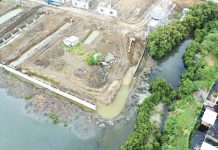 WHILE viewing a health show on TV, I saw a familiar figure arguing why he promotes herbal medicine.
WHILE viewing a health show on TV, I saw a familiar figure arguing why he promotes herbal medicine.
Dr. Jaime Galvez-Tan, a former secretary of the Department of Health (DOH), impressed me as the “maverick” of the Philippine medical profession because most of his colleagues prescribe only drugs stamped “approved” by the Food and Drug Administration (FDA).
In fact most food supplements in the market today are labeled “no approved therapeutic claim.”
“Herbal medicine has been practiced for more than a thousand years in the Philippines already,” Galvez-Tan said. “It could not have survived if it were not effective. It is common knowledge that drug capsules and tablets have herbal component.”
Coming as it did from a former DOH chief, that statement contradicted that of an Ilonggo doctor who had earlier warned dengue patients against drinking boiled tawatawa leaves.
“I cannot recommend that,” the doctor had said on cable TV. “No study proving its capacity to replenish blood platelets in dengue patients has been done.”
If so, then why has the FDA not initiated a study? A favorable result could have saved the DOH the amount of P3 billion spent for the ineffective Dengvaxia vaccine.
I can only suspect that no pharmaceutical manufacturer has applied for tawatawa’s approval. But now is the time to do just that. Remember, it was a local company, Pascual Laboratories, which had prevailed upon FDA to approve laboratory-processed lagundi as cough medicine.
Malunggay in capsule form, reputedly anti-diabetes, has remained just a “food supplement” because it has not passed through FDA’s “due process.”
There was a time when I asked a distributor of an alleged “immune system booster” (a bottled juice concoction) why his product is still labeled “no approved therapeutic claim.” Had he not sought FDA approval?
“Our company tried,” he lamented, “but we would have to shoulder the high cost of expensive and extensive laboratory tests and experiments to prove its medicinal value. We can’t afford that.”
In other words, only big multinational medicine producers can afford that. But as to whether an approved medicine can fulfill its “mission,” that always remains to be seen on case-to-case basis. You see, there was a time when a cardiologist prescribed to me an expensive FDA-approved anti-cholesterol “statin” tablet. Within a few days of taking the drug, however, I could hardly flex my arms due to excruciating muscle pains.
Going back to Dr. Jaime Galvez-Tan, he revealed on TV that the No. 1 prescription drug for malaria, Quinine, comes from the bark of the Cinchona tree, which grows abundantly in Mindanao.
Finally, Galvez-Tan reminded televiewers that a Greek more famous than he – Hippocrates (460-357 BC), the “father of medicine” – had long ago advised, “Let your food be your medicine.”
Hippocrates might have heard about traditional practitioners who had gained global patronage. Today, such originally doubtful practices as acupuncture and reflexology remain part and parcel of modern Chinese medicine.
Thanks to Dr. Jaime Galvez-Tan, the DOH, through its “Traditional Health Program”, has pronounced 10 indigenous herbs of medicinal value, including garlic, akapulko, ampalaya, sambong, tsa-ang gubat, ulasimang bato, yerba buena, niyog-niyogan, guava and lagundi.
Today, we all know that vegetables and fruits strengthen the body’s built-in immune system, giving it the capacity to fight disease-causing bacteria and virus.
No doubt, if a law could be passed requiring the FDA to exempt formulators of herbal medicine from spending too much for its approval, the locally-produced malunggay capsule would lose nothing but the label “no approved therapeutic claim.” (hvego31@gmail.com/PN)






There’s something wrong with this kind of mindset. Instead of empowering our local industries to pass safety and efficacy standards, this article is urging to think of alternative ways of going about or giving exemptions to these regulations. Regulations are instituted to protect the public health, more so with pharmaceuticals – medicines that either save or endanger lives depending on the dose. Come on. We do not want another Dengvaxia fiasco.
What we should do instead is capacitate the local pharmaceutical industry. Require DOST and DOH to INVEST in the RESEARCH on medicinal plants, so they may have PROVEN safety and EFFICACY. Then help them SCALE UP through the DTI and DOST. Give INCENTIVES through fiscal policies care of DOF. Produce a scientific and competent LABOR FORCE with the help of DepEd, CHED, and DOLE. It’s so easy to blame one agency, when we forget that in order to help the local industry, it requires the WHOLE OF GOVERNMENT.